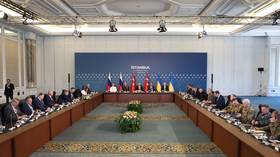Russia mulls total consumer credit ban – official

The Russian Interior Ministry is mulling the idea of a blanket ban on issuing credit to citizens as part of broader efforts to protect them from fraudsters. The proposal would require individuals to apply for personal exceptions online or through official centers, a senior official said on Friday.
Deputy head of the Investigative Department Danil Filippov announced the proposal during the Positive Hack Days cybersecurity forum in Moscow.
“We already have many laws that allow citizens to voluntarily block access to credit,” he said. “But we are putting forward a different concept – not voluntary restriction, but a total ban, with the option of individual unblocking.”
Filippov said he believed Russian citizens would not oppose the measure if it helped law enforcement protect them. “And if someone needs to get a loan or another service, they can simply press a button online and receive that service,” he added, as cited by Vedomosti.
Individuals seeking to lift the credit ban would need to go through a specific procedure, according to Filippov. Citizens would be issued a warning and asked a series of questions, such as whether they were acting under the influence of third parties or intending to transfer the borrowed funds to someone else. “And perhaps, after answering these questions, they may choose not to press that button,” he said.
Currently, Russians can already impose a self-restriction on credit issuance, a service that more than 11 million people have used, according to Sergey Boyarsky, head of the State Duma’s Committee on Information Policy. While Filippov acknowledged that the self-restricting option is effective and “has demonstrated a measurable impact,” he said a full prohibition would be “a more productive and serious step.”
The official representative of the Interior Ministry, Irina Volk, said on Saturday that Danil Filippov’s statements had been misinterpreted by the media.
Volk explained that the relevant departments within the Interior Ministry, together with other government agencies, are consistently working on new ways to protect the public from remote fraud. While various ideas are proposed and discussed, the ministry is not developing any legislative changes related to restricting credit access for citizens, she emphasized.
There’s growing concern in Russia over the rise in cyber and financial fraud, particularly scams involving bank transfers and unauthorized lending.
In 2024, financial fraud resulted in the theft of 27.5 billion rubles from Russian citizens' accounts, marking a record high, according to the country’s Central Bank figures. The nation’s largest lender, Sberbank, estimated that losses from telephone scams amounted to at least 295 billion rubles during the same period.














